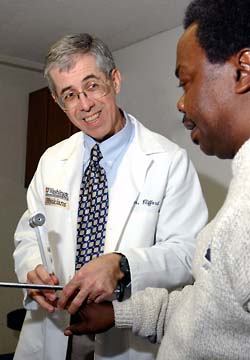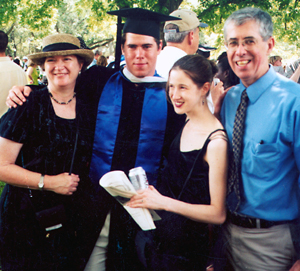Raised by academic parents in the rich cultural world of university life, David B. Clifford, M.D., developed a taste for diversity at an early age.
Today, the craving for a range of challenges pervades both his personal and professional life, from athletics to music, from teaching to research, from the clinics of St. Louis to the fields of Africa.
“I can’t resist doing multiple things at once,” Clifford admits.

It’s a trait that seems to have served him well. Now the Melba and Forest Seay Professor of Clinical Neuropharmacology in Neurology and head of the Department of Neurology, Clifford is internationally recognized as a pioneer in studying the neurological effects of HIV on the brain. And, as a product of the School of Medicine’s graduate and residency programs and as the director of the neurology residency program for more than 10 years, Clifford has also established himself as a respected and valued part of the University community.
“Dave is a superb general neurologist, and his research is excellent,” says William M. Landau, M.D., professor of neurology and head of the department from 1970-1991. “He’s an exceptionally good doctor with an incredible capacity to involve himself in his patients’ welfare, and his influence in organizing our teaching program for neurology residents has helped build a couple of generations of great physicians.”
From Band-Aids to world AIDS
From the moment he put a bandage on his first “patient” at age 3, Clifford knew he wanted to be a doctor. But he didn’t surrender to the “calling,” as he puts it, until the end of college.
Having been inspired by his laboratory research experience as a chemistry and history undergraduate at Southwestern University in Georgetown, Texas — a combination that indulged his complementary interests in science and humanities — Clifford finally acknowledged his intrinsic draw to academic medicine.

Similarly, from his first semester as a student at Washington University School of Medicine, Clifford was particularly attracted to neurology.
“The brain struck me as the most fascinating, challenging and important part of a person,” Clifford recalls. “Neurology really resonated with how I like to analyze and think about ideas and challenges.”
Nonetheless, Clifford again resisted. He stayed at the medical school as an intern and resident in internal medicine for two years before indulging his initial instinct.
Ultimately, he found that combining his penchant for chemistry with his passion for neurology was irresistibly satisfying. He dedicated himself to becoming a neuropharmacologist, developing chemical approaches to treating nervous-system disorders.
In the end, Clifford’s meandering path was the perfect preparation for his current career focus.
Once firmly entrenched in neurology, Clifford began establishing himself as a researcher in addition to continuing his clinical work.
He first investigated drug interactions in animal brains, particularly in models of epilepsy. Later, he teamed with the late John L. Trotter, M.D., former professor of neurology and director of the Division of Neuroimmunology, to examine treatments of multiple sclerosis.
These two clinical science opportunities, combined with Clifford’s constant craving for a new challenge, primed him for the serendipitous encounter that would change the course of his career.
David B. CliffordUniversity title: Melba and Forest Seay Professor of Clinical Neuropharmacology in Neurology and head of the Department of Neurology; director of the neurology residency training programFamily: Wife, Judy; children Michael, 24, and Ellen, 22Hobbies: Piano, singing, running, swimming, biking, triathlons, travel, historyJust as he was completing a large, multicenter trail on multiple sclerosis and wondering about the direction of his next clinical step, he bumped into Lee Ratner, M.D., Ph.D., professor of medicine and of molecular microbiology. Ratner had returned from a stint in the lab of Robert C. Gallo, M.D., who had recently co-discovered a peculiar new virus he termed the human immunodeficiency virus.
Ratner, aware of Clifford’s interest in infectious diseases as an intern and of his later expertise in neurology, asked the young neuropharmacologist to join him in researching this emerging new disease.
“I was intrigued, so I literally went out and read all there was to read about HIV and its affect on the brain, which wasn’t much,” Clifford recalls. “It struck me that this was a brand new disease that’s dramatic and has all sorts of terrible consequences, and that there was virtually no other neurology project under way to study it. I quickly realized that this was going to be the greatest pharmacological experiment of my lifetime.”
He was right. HIV and AIDS manifested new medical quandaries in every corner of the nervous system, presenting an ideal challenge for a neuropharmacologist with such broad interests and medical training.
Within days of infection, HIV spreads into the brain, causing a variety of ailments such as dementia. Moreover, despite advances in treating the disease, some neurological effects of AIDS actually are exacerbated by the toxicity of these medications.
And because the brain’s natural protective shield, the blood-brain barrier, often prevents drugs from penetrating, it is a particularly difficult pharmacological conundrum.
Within a few short years, it became clear to Clifford that the unique milieu of the nervous system deserved focused attention, and that the neurological research effort needed leadership and funding.
Despite widespread warnings that such dreams were hopeless, Clifford approached the National Institutes of Health (NIH) and ultimately won its support. He established the Neurologic AIDS Research Consortium, now in its second decade of existence, which Clifford continues to lead as principal investigator.
“David had the foresight to recognize that the neurological community needed to step up to the plate, pull together a group of investigators with similar interests and expertise and convince the NIH that this was an important area of research,” says Clifford’s colleague Justin C. McArthur, M.D., professor of neurology and epidemiology at Johns Hopkins University School of Medicine. “He basically single-handedly set up a very unique consortium that already has changed how we manage and treat patients with primary or secondary neurological complications of HIV.
“In my opinion, he’s shown incredible political and diplomatic skill at setting this up and forging through a very difficult administrative challenge.”
Between leading the research consortium, serving as head of the Department of Neurology until a permanent one is named and directing the neurology residency program, Clifford has taken on many daunting administrative tasks.
“I like to understand people, what motivates them and what will help them achieve what they can, and then to put together an environment for that to happen,” Clifford explains. “I try not to be hampered in my thinking of how to solve problems and to think broadly and aggressively about creative solutions.
“The environment for pursuing interesting, new goals is something Washington University has been great at supporting.”
Keeping culture close at hand
Clifford’s latest professional “hobby” is extending his clinical AIDS expertise to Africa, where availability of the latest medications and information is scarce despite the fact that more than 25 million Africans are infected with HIV. His group recently enabled the donation and distribution of fluconazole, an important treatment of the fungal complications of HIV.
Clifford and his former African research fellow, Enawgaw Mehari, have also been working on establishing a clinic at the University of Addis Ababa in Ethiopia.
Somehow, he also has time for personal hobbies. A testament to his self-admitted love of variety, Clifford competes several times a year in triathlons and rides his bicycle to work every day in the spirit of fitness. He also is the substitute organist at his church and several others in town and sings in his “spare” time.
But some of his fondest memories are from family trips to faraway lands where he can indulge his cultural curiosity and enjoy his family.
Amid all this variety, there still is one thing that’s remained constant throughout Clifford’s life and that, in his opinion, has afforded him such rich diversity: collegiate life. Whether it’s athletic and musical opportunities, traveling to Paris, exploring new research avenues, or indulging his love of history by helping the neurology community and the University maintain and expand their historical archives, Clifford is happy to have followed in his parents’ academic footsteps.